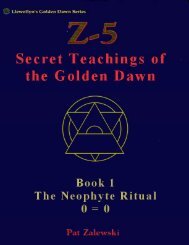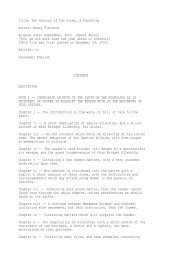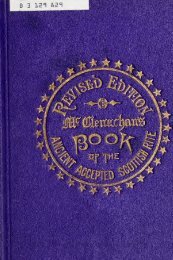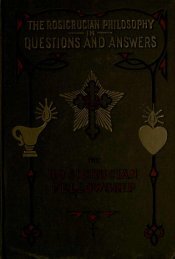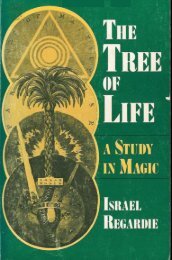Click to download PDF version: 3.87MB - Global Grey
Click to download PDF version: 3.87MB - Global Grey
Click to download PDF version: 3.87MB - Global Grey
You also want an ePaper? Increase the reach of your titles
YUMPU automatically turns print PDFs into web optimized ePapers that Google loves.
32 At the Back of the Black Man's Mind By R. E. Dennett<br />
property. But where the father of a family has been neglected by his relations, he<br />
sometimes takes his revenge on them by dividing his property among his children while<br />
he is yet alive. The mother has no property of her own, but is the guardian of that of her<br />
children, and should they die this goes <strong>to</strong> her family.<br />
Both the father and mother watch over the interests of their children, and can punish<br />
them.<br />
The mother alone has the right <strong>to</strong> pawn her child, but she must first consult the father,<br />
so that he may have the chance of giving her goods <strong>to</strong> save the pledging. The father<br />
cannot pledge his child. The brother can pawn his sister, or the uncle his niece, the<br />
mother being dead. But the father being alive the uncle must go first <strong>to</strong> him <strong>to</strong> give him<br />
the chance of helping him out of the difficulty by means of a loan of goods. If the uncle is<br />
what they call a bad man, the father will call witnesses <strong>to</strong> see the cloth that he is lending<br />
the uncle who would pawn his child, he takes up a kernel of the palm nut in their<br />
presence and drops it in<strong>to</strong> his box; which being interpreted means that he has bought<br />
his daughter. Until this debt is paid <strong>to</strong> the father the uncle cannot raise the wind on that<br />
child again. A person is never free from being pawned in this way.<br />
Parental authority is really never lost, for the father has always the right <strong>to</strong> ransom the<br />
child, who never ceases <strong>to</strong> look <strong>to</strong> him as its father. But as the child often settles down in<br />
the village of its pawnee and becomes the parent of children, the amount needed <strong>to</strong><br />
ransom it increases in proportion <strong>to</strong> the child's offspring. The deb<strong>to</strong>r has <strong>to</strong> pay double<br />
the amount he borrowed and so much for every child. Even then the child may elect <strong>to</strong><br />
remain where it is.<br />
A child or children bereft of all family ties may be adopted by one of the father's friends,<br />
who calls it or them (Muana bika wali) the child my friend left. Under this kind of<br />
artificial parentage the adop<strong>to</strong>r can neither sell nor pawn this child, nor has he any hold<br />
on its earnings; it is a work of love and honour, but he looks <strong>to</strong> the gratitude of the child<br />
<strong>to</strong> make it up <strong>to</strong> him in some way or other.<br />
Section IV.-Of Guardianship, of Emancipation, and Prohibition.<br />
The French law recognises four kinds of guardianship:<br />
1 That of the survivors of the fathers and mothers.<br />
2. That by will conferred by the fathers or mothers dying last.<br />
3. That of the next of kin.<br />
4. That which is disposed of by a meeting of the family.<br />
The Bavili recognise six forms of guardianship, in order:<br />
1 The grandfather. Xinkaka xi andi.<br />
2. The father's family. Xitata.<br />
3. The mother's father. Xinkaka xibuta.<br />
www.globalgrey.co.uk



